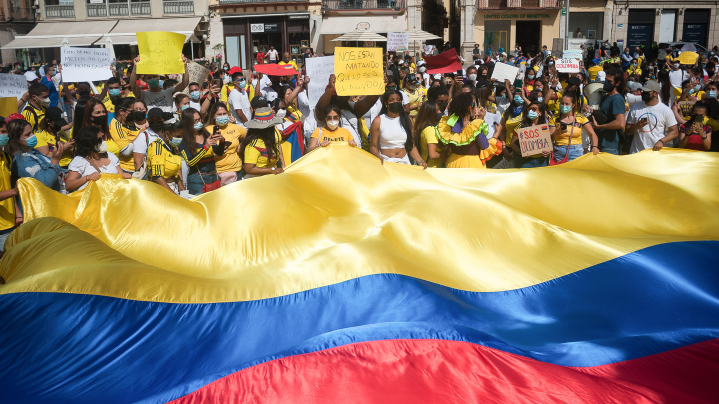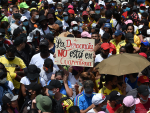Share factual information.
News coming out of Colombia is fuzzy as disinformation abounds. Check with reliable organizations on the ground like local NGO Temblores or the Campaign Defend Liberty.

Getty Images
One week after a national strike erupted in Colombia against a pandemic-related tax reform, at least 37 demonstrators have died from police violence, according to the local non-profit organization (NGO) Temblores. The mass protests started on April 28 in a fierce rebuke to a tax proposal that would raise the price of basic foods and widen the tax base to include more middle-class workers. While purporting to ease an economic recession set off by the pandemic, the reform was slammed by protestors who argued it burdened the people already hit hardest by multiple lockdowns and pandemic restrictions.
Colombia’s biggest unions went on strike and were joined by thousands of people in cities across Colombia who expressed their discontent with the tax proposal, social inequities, police brutality, the poor implementation of the peace deal, and other issues. A growing number of Colombians, 42.5% of them to be exact, are living in poverty after 14 months of the COVID-19 pandemic; 16.8% of Colombians have also been unemployed as of March. While the reform has been formally withdrawn by the administration of conservative President Ivan Duque, a long list of grievances continues to draw thousands to the streets every day.
With the casualty toll rising, Colombians are using the hashtag #SOSColombia to call international attention to the deadly police repression unfolding. In their latest report, Temblores registered 1708 cases of police violence, 37 deaths, 831 arbitrary detentions, and 10 sexual assaults. The excessive use of force has not gone unnoticed by international bodies like the United Nations, which condemned the violence. Under mounting pressure, the government withdrew the tax proposal earlier this week and announced a sit-down with union leaders. Yet, violence persists. On Wednesday, 37-year-old Lucas Villa, from Pereira, was the latest protestor to be killed during protests.
With events reaching a flash point, support from abroad can make a big difference. Here are five ways you can help Colombian protestors fighting on the frontlines:
News coming out of Colombia is fuzzy as disinformation abounds. Check with reliable organizations on the ground like local NGO Temblores or the Campaign Defend Liberty.
Protestors are working around traditional media to get information out as quickly as possible. Evidence of police violence is spreading like wildfire on the hashtag, but so is solidarity from abroad.
People in Berlin, Toronto, Madrid, New York City and other cities around the world are applying pressure on Colombia’s embassies abroad. Join solidarity rallies or organize an event in your city—all while ensuring proper COVID-19 precautions.
Organizations like the Washington Office on Latin America (WOLA) are drawing connections between U.S. aid to Colombia and the police’s bloody repression of protestors. Support calls to suspend the U.S.’s training and sale of equipment to Colombia’s riot police known as ESMAD until guarantees are instituted to protect protestors.

